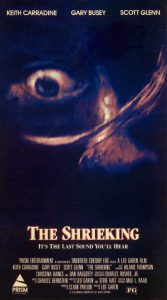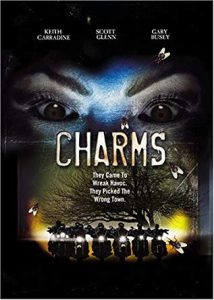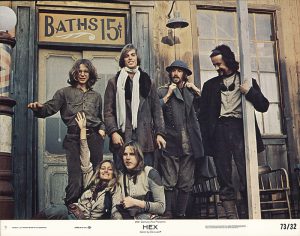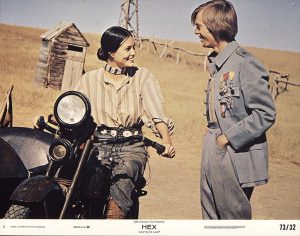#FridayNightAtTheHomeDriveIn
Hex (1973) by #LeoGaren
And what an amazing cast!#KeithCarradine #CristinaRaines #ScottGlenn #HilarieThompson #RobertWalkerJr #GaryBusey #DanHaggerty
"They Came to Wreak Havoc. They Picked the Wrong Town."#70s #Horror #Biker#NotQuiteClassicCinema pic.twitter.com/lwk4nInJR0— Angus Kohm (@AngusKohm) February 29, 2020
I rented Hex (1973) on VHS many years ago. My memory of that first viewing is a little hazy, except for the fact that I thought the movie was strange – and not at all what I was expecting. It was supposed to be a biker film of sorts; a biker horror film, in fact (or is the correct term, horror biker film?) I suppose I had visions of something more like Psychomania (also released in 1973, oddly enough), but Hex is nothing like that.
Some VHS tapes called the movie The Shrieking, which is an intriguing title but not as clear to me as Hex. I picked up a bargain bin DVD version on my travels last November which re-brands the movie Charms (which sort of makes it sound like a feel-good comedy, or a breakfast cereal). Not sure why they didn’t just stick with Hex, unless they’re trying to convince people that it’s a different movie. “No, this isn’t that weird biker horror movie Hex that you saw before, this is a charming and delicious horror biker film. Buy it!”
Hex isn’t really a biker film in the true sense of the genre. It’s set in post World War I Nebraska, during the dying days of the wild west era – which kind of makes it a Western. I actually have a theory that all biker movies are Westerns, with motorcycles taking the place of horses, but that’s another story.
Most Westerns are set between 1865 (the end of the civil war) and the late 1890s. There are a few that take place during the civil war, and some even before that. I also believe that the period can extend up to (and include) World War I (and that it was the war that ushered in the next era of North American history). So the two wars are kind of like the book-ends of the Western genre proper. Of course there are also plenty of modern Westerns like Lonely Are the Brave (1962) and The Three Burials of Melquiades Estrada (2005) which are set in their respective times of production, but basically Westerns are period pieces, and Hex is most certainly that.
According to the IMDb, John Carradine – who was in classic Westerns like Stagecoach (1939) and Jesse James (1939) – played a character called “Old Gunfighter” in Hex, but his part is not included in any of the surviving prints of the film (thus far). It is considered a lost performance. For people like me, who are fans of horror films, other genre films and so called psychotronic movies, John Carradine is an icon and a legend, and his lost performance would be reason enough to hope for a restored, remastered and complete version of Hex making it onto Blu-ray and DVD at some point in the future.
Incidentally, John Carradine’s son Keith Carradine stars in Hex as the leader of the bike gang. It was apparently his first starring role, shot in 1971.
Hex boasts an amazing cast of recognizable faces, including Cristina Raines, Scott Glenn, Hilarie Thompson, Robert Walker Jr., Gary Busey, and Dan Haggerty. Cristina Raines is perhaps best known (at least to me) for starring in one of my personal favourites, The Sentinel (1977), another supernatural horror film. In The Sentinel, directed by MIchael Winner, Raines is drawn into the supernatural horror when she moves into an old building. In Hex, Raines and her sister bring the supernatural horror down on the bikers when they temporarily move onto her family farm and run afoul of the two young women.
Incidentally, Cristina Raines also appears in another Michael Winner film (and personal favourite of mine) The Stone Killer (1973), but the IMDb incorrectly credits Christa Raines (at least at the time of this writing).
Apparently Cristina Raines and Keith Carradine became romantically involved during the making of Hex in 1971, and were together until 1979. They were both also in Robert Altman’s Nashville (1975) and Ridley Scott’s first feature The Duellists (1977).
When I first saw Hex all those years ago, I dismissed it as a weird movie. Now, I embrace it as a weird movie. Weird is good. Weird is what makes it worth watching. It is unlike any other Western, or Biker Film, or Horror FIlm that I have ever seen. That’s not to say that it is unrecognizable, or impenetrable. It’s easy to follow, for the most part, and logical in its own way. Some aspects may be problematic for some viewers, and it’s certainly not for everyone, but I found myself charmed – hey, maybe that title makes sense after all!
Hex AKA The Shrieking AKA Charms (1973) is a unique, but entertaining example of #NotQuiteClassicCinema and it makes for a fascinating #FridayNightAtTheHomeDriveIn.





